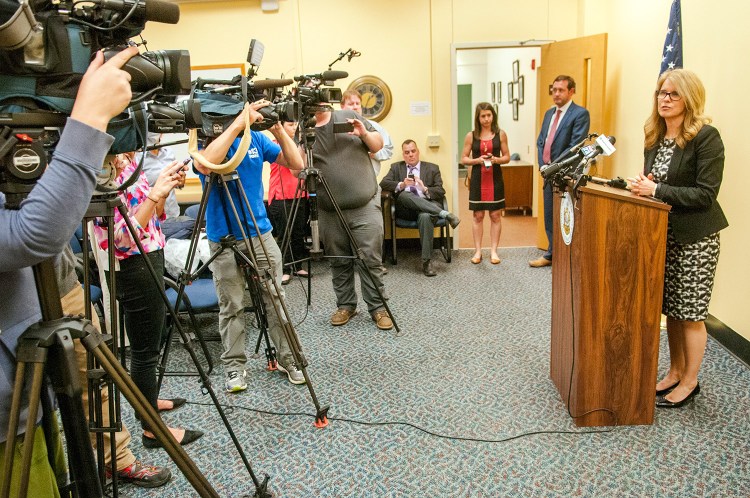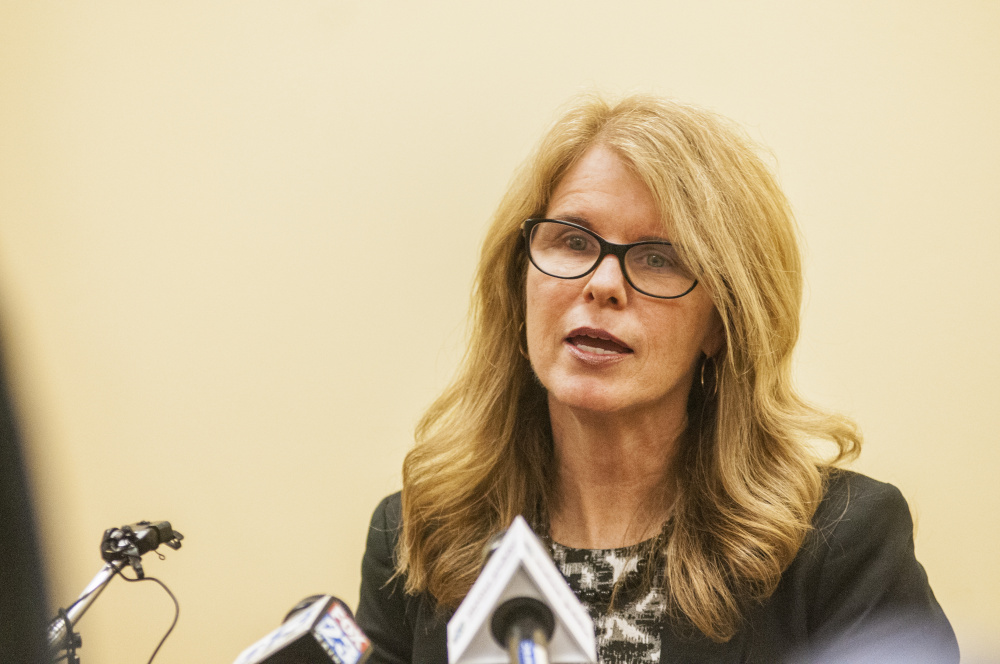AUGUSTA — Mary Mayhew is stepping down as commissioner of the Department of Health and Human Services after spending more than six years leading Gov. Paul LePage’s controversial push to reform Maine’s public safety net.
As head of the state’s largest agency, Mayhew has been at the forefront of LePage’s bid to revamp programs that affect thousands of Mainers, including efforts to tighten requirements for Medicaid enrollees, re-establish work requirements for food stamps, clamp down on welfare fraud, and advocate for other changes, such as forbidding junk food purchases with food stamps.
Mayhew gave a brief statement to assembled reporters Wednesday afternoon at DHHS headquarters in Augusta, but refused to take questions and did not address speculation that she will run for governor in 2018. Friday is her last day.
Her tenure at DHHS also included a tumultuous time at Riverview Psychiatric Center, which lost its federal certification in 2013 over deficiencies in patient care. Mayhew was criticized by some health advocates for a slow and weak response to the state’s opioid crisis. She also was in charge during a bureaucratic crisis in 2013, when many MaineCare recipients were not receiving their rides to doctor’s appointments. In addition, DHHS also was roundly criticized by public health officials in 2014 for the state’s attempts to quarantine a nurse who had returned to Maine after helping ebola patients in West Africa.
She said that under her leadership, the department addressed its financial problems and is now financially solvent.
“When I started, we were hemorrhaging red ink,” Mayhew said. “It took a great deal of fortitude to make difficult decisions to prioritize limited resources so we could support the most vulnerable populations in our state.”
The state consistently operated with Medicaid deficits in the late 2000s, during the recession, including a $137 million shortfall in 2009.
Medicaid spending in Maine has remained flat at about $2.6 billion over the past few years, after decades of sharp increases. At the same time, under Mayhew’s tenure the number of DHHS employees declined from about 3,700 to 3,400.
CLASHING VIEWS OF PERFORMANCE
Mayhew gave no explanation for her departure, nor did she reveal her plans for the future. A statement by LePage said her replacement would be announced by the end of the week. Her salary in 2016 was $137,000, according to a state database.
“Commissioner Mayhew has done an exceptional job in managing DHHS and reforming Maine’s welfare system,” LePage said in a statement Wednesday announcing her departure. “She spearheaded the many important welfare reforms developed under my administration, and she was the lightning rod for constant criticism from the media, liberal legislators and the special interests who wanted to protect and grow Maine’s entitlement programs.”
LePage praised Mayhew’s performance in managing DHHS spending and keeping the agency’s budget balanced.
“Maine taxpayers, as well as those who have found success moving from welfare to work, should thank Mary for a job well done,” the governor said. “We are truly sorry to see her go, but we wish her all the best.”
Mike Tipping, communications director for the Maine People’s Alliance, a left-leaning Bangor-based advocacy group, said Mayhew’s policies have hurt Maine and ripped health insurance away from thousands.
“Her mismanagement of the department is only matched by her cruelty,” Tipping said.
Robyn Merrill, executive director of Maine Equal Justice Partners, a left-leaning group that advocates on behalf of Mainers served by DHHS programs, said Mayhew’s legacy will include more hungry children and people living in deep poverty. Merrill said Mayhew has relentlessly “demonized, punished and blamed” low-income families.
“Ultimately, since she has been commissioner, life has gotten a lot harder for a lot of Maine families,” Merrill said.
Maine ranked third-worst among the 50 states for families suffering from hunger, according to a 2016 study done for the Preble Street social services agency and the Good Shepherd Food Bank.
“Her legacy is a lot more hungry children in Maine,” Merrill said.
LePage’s administration has been relatively successful in changing components of the state’s welfare system in recent years, including putting in place work requirements for those accepting food benefits under the Supplemental Nutrition Assistance Program, previously known as food stamps, as well as changing eligibility requirements for Medicaid. About 270,000 Mainers have health insurance through MaineCare. Roughly 350,000 were on the program when LePage took office in 2011, before the administration tightened eligibility requirements, kicking more than 40,000 low-income adult Mainers off the program.
Food stamp recipients have fallen from a high of 255,000 in 2012 to 185,000 currently, although the economy also plays a large role in how many people use public assistance programs. The national economy has improved since 2012.
LePage’s current budget also looks to further restrict welfare benefits in Maine by reducing the maximum time that a family can receive state and federally funded Temporary Assistance to Needy Families cash benefits from 60 months to 36. About 12,000 Maine families could be affected by that change. Another 20,000 Mainers could lose their health care coverage under a proposal by LePage to further tighten eligibility requirements for MaineCare by lowering the amount that parents with children can earn and still qualify.
In January, LePage and Mayhew sought federal approval to charge MaineCare recipients monthly premiums and co-pays for services if it is determined they have an ability to earn an income.
TAKING TOUGH – OR MEAN – ACTIONS
Sen. Eric Brakey, R-Auburn, co-chair of the Legislature’s Health and Human Services committee, said Mayhew has gone a great job leading DHHS.
“I have been consistently impressed with Mary Mayhew’s ability to make the tough decisions,” Brakey said. “We have seen in past administrations how easy it is to mismanage taxpayer resources by promising government that seeks to be all things to all people. As DHHS commissioner, Mary Mayhew has taken the more difficult road less traveled, protecting Maine taxpayers by focusing limited resources on core priorities.”
But Dr. Patty Hymanson, the Democratic representative from York and also a co-chair of the committee, said Mayhew’s approach doesn’t work.
“Unfortunately, under the administration of Governor LePage and Commissioner Mayhew the department has failed to invest in Maine’s future and operated under the belief that people can be punished out of poverty,” Hymanson said.
Mayhew first entered politics when she was in her 20s, working as an aide to U.S. Rep. Bill Alexander, D-Arkansas. She was a vice president at the Maine Hospital Association before joining the LePage administration in 2011.
Staff Writer Scott Thistle contributed to this report.
Joe Lawlor can be contacted at 791-6376 or at:
at jlawlor@pressherald.com
Twitter: @joelawlorph
Send questions/comments to the editors.





Success. Please wait for the page to reload. If the page does not reload within 5 seconds, please refresh the page.
Enter your email and password to access comments.
Hi, to comment on stories you must . This profile is in addition to your subscription and website login.
Already have a commenting profile? .
Invalid username/password.
Please check your email to confirm and complete your registration.
Only subscribers are eligible to post comments. Please subscribe or login first for digital access. Here’s why.
Use the form below to reset your password. When you've submitted your account email, we will send an email with a reset code.